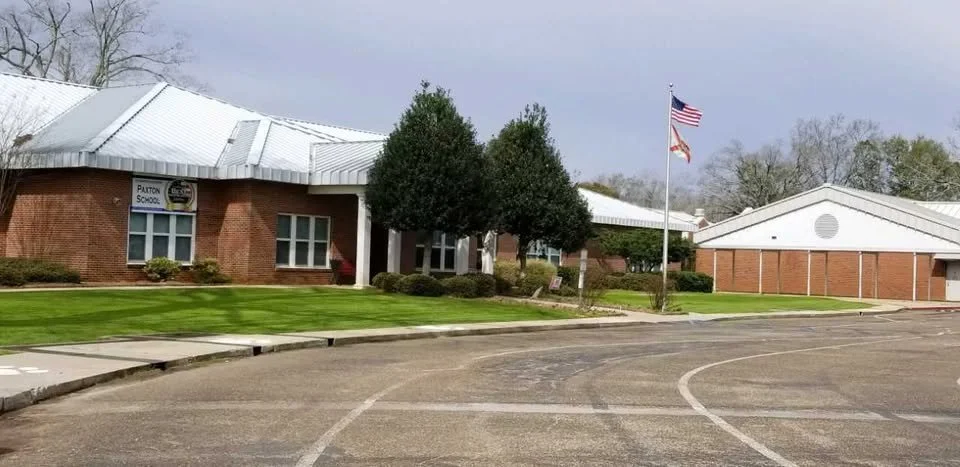Paxton, FL
Paxton is a small, rural town in northern Walton County, Florida, characterized by its agricultural roots and quiet, close-knit community. Located near the Alabama border, it is known for being close to the highest point in Florida, Britton Hill, situated in Lakewood County Park. With a population of around 600 people, the town is family-oriented and maintains a strong sense of local pride.
History
Early Settlement: The area was a stop on the Creek Indian's Red Ground Trail, and its prominent feature was a large natural lake the Creeks called Big Pond. European settlers began arriving in the late 1830s after the conflict between immigrants and the Creek Nation.
Timber Industry: Paxton's modern founding came with the rise of the timber industry in the early 20th century. In 1903, the Florala Sawmill Company opened a mill near Lake Jackson (the former Big Pond), attracting a workforce and spurring the town's development. The town was named after John Paxton, a Chicago investor in the sawmill company.
Agricultural Base: Although founded on timber, Paxton has always had strong agricultural roots. The economy was sustained by farming and later diversified to include poultry, dairy, and beef cattle.
Modern life and culture
Community Hubs: The town's small size has fostered a strong community spirit, with the local school and agricultural center serving as central gathering places. The
Paxton Agricultural Center
offers a glimpse into the area's farming industry and hosts local events, such as the annual Bobby Kemp Sr. Heritage Day festival.
Recreation: For recreation, residents and visitors enjoy the outdoors at nearby Lake Jackson , which straddles the Florida-Alabama line. A popular destination is Lakewood Park, which contains Britton Hill, the highest point in the state.
Panhandle Culture: Paxton embodies the quiet, rural character of the Florida Panhandle, with a culture shaped by its agricultural heritage and natural surroundings.
Paxton School
Paxton School has been a cornerstone of the rural northern Walton County community since its founding in 1939. Situated just a few miles from Florida's highest point, Britton Hill, the school serves as a centralized hub for a close-knit, family-oriented town. As a pre-kindergarten through twelfth-grade institution, it uniquely provides a continuum of education for students from their first days of school to their high school graduation, all on one campus. Over its decades-long history, the school has maintained a strong connection to the area's agricultural heritage through its renowned agricultural program, which is celebrated for producing award-winning hogs.
In its modern form, Paxton School remains a pillar of the Walton County School District, consistently earning high academic rankings. The school offers a range of traditional and specialized programs to its students. Beyond academics, Paxton School is well-known for its athletic programs, particularly its basketball teams, which have secured numerous state championships over the years. The school's strong sense of community and family atmosphere is often highlighted by former students and local residents, who emphasize the personal care and attention given to students and their families. This focus on a supportive environment, combined with its long-standing history, has solidified Paxton School's position as a vital institution in the Paxton area.
Paxton School’s Agricultural Program
Paxton School's agricultural program is a long-standing institution that has been a defining feature of the school since its early days, deeply interwoven with the rural, agricultural character of northern Walton County. Its history is a testament to the school's commitment to hands-on, vocational education that reflects and supports the local community's economy and way of life. The program, which includes its highly successful FFA (Future Farmers of America) chapter, has provided generations of students with practical skills, leadership development, and a connection to the region's farming heritage.
The program's history is closely tied to the area's agricultural base, which evolved from the timber industry of the early 20th century to a more diversified economy of farming and livestock. While many rural schools have seen their agricultural programs decline over the years, Paxton School has maintained and grown its program, adapting it to both traditional and modern agricultural practices. This blend of tradition and innovation is reflected in the program's offerings, which include not only livestock-raising projects but also more technical courses in agritechnology. The success of the program is demonstrated by its reputation for producing award-winning hogs, which showcases the skills and dedication of its students.
Over the years, the program has been a pipeline for developing local talent and a source of pride for the community. Students regularly participate in Future Farmers of America (FFA) events, showing their livestock at competitions and engaging in hands-on learning that extends beyond the classroom. The agricultural program at Paxton is more than just a set of courses; it's a living tradition that reinforces the town's identity and prepares students for a variety of careers, whether they choose to stay in agriculture or pursue other fields. The program's enduring strength is a direct reflection of the supportive environment fostered by the school and the wider Paxton community.
Paxton FFA Chapter
The Paxton FFA chapter, deeply rooted in its community's agricultural heritage, has achieved notable success at both district and state levels in Florida. While information on specific historical awards is not widely publicized, recent achievements highlighted by the Walton County School District and the Paxton FFA chapter itself point to its ongoing success.
District and state-level recognition
District champions: In January 2020, the Paxton middle school FFA chapter took first place at a district competition, qualifying them to compete at the state level. This achievement showcases the chapter's strength in competition and its ability to develop talent from a young age.
Contest success: Recent social media posts confirm the chapter's continued success in district-level contests. A January 2025 post highlighted strong results in the District Contest, including a second-place finish in a Discussion Meet, indicating proficiency in public speaking and agricultural knowledge.
Livestock judging awards: In a recent competition, the high school livestock evaluation team won third place at a livestock judging competition at the Florida Strawberry Festival. The team successfully competed against other high school FFA teams, demonstrating their expertise in evaluating livestock.
A reputation for excellence in livestock
The Paxton FFA program is particularly well-known for its award-winning hogs, which speaks to its long-standing commitment to hands-on agricultural education. This reputation is built on years of success at various shows and competitions, where students consistently earn recognition for the quality of their livestock. The emphasis on practical skills is a hallmark of the program and a major factor in its achievements.
The Red Ground Trail
The Red Ground Trail was a vital historical route for the Creek people that ran from central Alabama through what is now the Paxton area of Walton County, down to Escambia Bay. Its historical significance to this region is multi-faceted, reflecting the deep connections the Creek people had to the land long before European-American settlement.
Economic and social lifeline
Trade route: As a primary thoroughfare, the trail was an essential trade artery for the Creek Nation. It facilitated the exchange of goods and ideas between different Creek communities and other indigenous groups throughout the Florida Panhandle and into Alabama. This network of trails was a crucial part of the Native American trading system that existed long before European contact.
Cultural connection: The
Red Ground Trail
connected Creek towns and hunting grounds, serving as a pathway for travel, communication, and social interaction. It was part of a larger network of trails that allowed the Creek people to maintain a cohesive culture across their extensive territory, which once spanned much of present-day Alabama, Georgia, and northern Florida.
Strategic location
Meeting point: A key landmark along the Red Ground Trail in the Paxton area was a large natural lake that the Creeks called Big Pond, later renamed Lake Jackson. This stopping place was an important rest stop and staging ground for travelers, traders, and hunters. Its strategic location, with easy access to water and the surrounding wilderness, made it a valuable resource.
Boundary line: The trail and the bodies of water it connected played a role in delineating territory. In the 1700s, the Blackwater River, which is connected to the wider network of Creek trails, served as a boundary between the hunting grounds of Upper and Lower Creek tribes.
European-American impact
Early settlement: The trail's established route attracted the first European-American settlers to the Paxton area in the late 1830s. Following the conflict between immigrants and the Creek Nation, the trail essentially provided a pre-established pathway for westward expansion.
Trail of Tears: After the forced removal of many Creeks to Oklahoma, Northwest Florida, and the trails that crisscrossed it, became a "highway for oppressed and struggling Creeks" seeking refuge. The Red Ground Trail is a somber reminder of this history, representing a critical part of the migration for those escaping federal removal policies.
Lasting legacy
Today, the legacy of the Red Ground Trail lives on in the form of the Jackson Red Ground Trail, a segment of the Florida National Scenic Trail. This modern trail honors the historic Indian and settler trade route, preserving the memory of its importance to the region's indigenous and early American history. It serves as a physical reminder of the Creek Nation's deep roots and historical presence in what is now Walton County.


